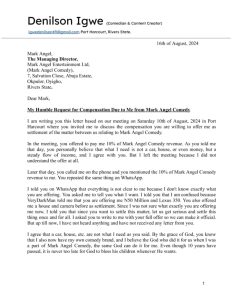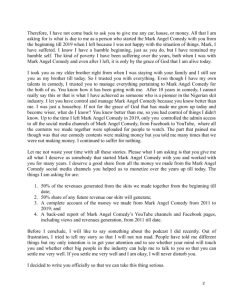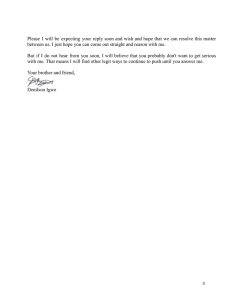In what has become a riveting legal battle within Nigeria’s entertainment scene, comedian Denilson Igwe has taken legal action against his former collaborator Mark Angel, the mastermind behind the highly successful Mark Angel Comedy series. Igwe, one of the pioneering faces of the viral comedy skits, has accused Mark Angel of unjust enrichment, unfair talent exploitation, and other grievances, seeking a substantial $1.5 million in compensation.
Denilson Igwe was one of the co-founders and central figures in Mark Angel Comedy, a brand that gained global recognition through its short, humorous videos featuring relatable, everyday scenarios in Nigerian life. The comedy troupe, most notably boosted by the antics of child comedian Emmanuella, became a staple on YouTube, accumulating millions of views and fans worldwide.
Igwe’s contributions to the success of the platform cannot be overstated. He was not just an actor but also a producer and content creator who was integral to the formation and growth of the brand. However, behind the scenes, tensions were brewing as Igwe felt increasingly marginalized, alleging that his creative and financial contributions were being overlooked.
In the lawsuit filed by Igwe, he accuses Mark Angel of exploiting his talent without proper compensation. He alleges that despite his significant role in the comedy series’ success, he was not adequately remunerated or given his fair share of the profits. According to Igwe, while the Mark Angel Comedy empire flourished, he received only a fraction of what he was owed for his creative efforts.
Unjust enrichment is central to Igwe’s claims. He argues that Mark Angel benefited disproportionately from the partnership, reaping rewards while sidelining him. This legal term refers to a situation where one party profits at the expense of another without a fair basis, which Igwe believes perfectly describes his involvement in the comedy business.
Igwe’s legal counsel also points to what they describe as unfair talent exploitation. In the highly competitive world of digital content creation, individuals who are front-facing talents often find themselves at the mercy of larger, more powerful producers and owners of platforms. Igwe contends that his reputation and talent were heavily utilized to build the Mark Angel Comedy brand, yet his financial compensation never matched the value he added to the platform.
Denilson Igwe is seeking $1.5 million in compensation, a figure that represents what he perceives as his rightful share of the profits, royalties, and intellectual property from the time he worked with Mark Angel. This demand also includes claims for emotional distress, lost opportunities, and reputational damage.
The lawsuit has cast a spotlight on the often unspoken tensions that arise within creative collaborations, especially in the rapidly evolving entertainment industry. With content creators and digital entertainers becoming increasingly important in the media landscape, disputes over profit-sharing, intellectual property rights, and contractual obligations are bound to emerge.
At the time of writing, Mark Angel has yet to make an official public statement regarding the lawsuit. However, sources close to the comedian suggest that he might push back against the allegations, potentially framing the dispute as a misunderstanding of contractual agreements and revenue sharing.
This lawsuit could have wider implications for Nigeria’s entertainment industry, particularly in the fast-growing digital comedy space. It highlights the need for clearer contracts and fairer negotiations between talent and producers, ensuring that all parties involved in creating a brand benefit equitably from its success.
For upcoming content creators, this case serves as a cautionary tale about the importance of securing legal agreements that clearly outline financial expectations and intellectual property rights from the outset. As the industry continues to expand and evolve, such disputes may become more common unless frameworks are established to protect all stakeholders involved in creative collaborations.
The lawsuit between Denilson Igwe and Mark Angel underscores the complex nature of partnerships in the digital age, where success often leads to behind-the-scenes disputes over finances and ownership. As the case unfolds, the Nigerian entertainment community will undoubtedly be watching closely, recognizing that its outcome could reshape future relationships between talent and producers.
Denilson Igwe’s quest for justice may inspire others in the industry to reassess their contracts and partnerships, ensuring that creative efforts are adequately rewarded.







